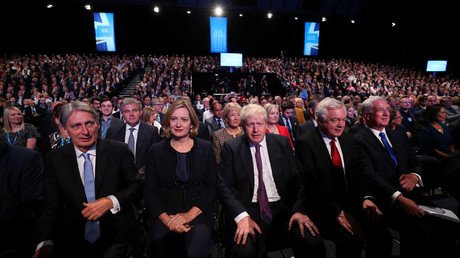RT looks at how powerful men are protecting themselves against sexual harassment allegations

In workplaces across the UK, including Parliament, people in positions of power are sexually harassing workers with lewd comments and even unwanted physical touching. Hush money, fear of jeopardizing one’s career, a culture of silence and crafty legal agreements are shutting victims up.
While we’ve heard extensively about the lurid and appalling allegations against Harvey Weinstein in Hollywood, and the ongoing ‘sex pest’ claims coming out of Westminster, there is no doubt that workplace harassment is happening on a regular basis to ordinary British women and men. It is a vast, systemic problem that goes beyond specific industries, businesses or political parties.
Trades Union Congress (TUC) research suggests 52 percent of women have experienced some form of sexual harassment at work, varying from inappropriate jokes to groping. Shockingly, almost 20 percent cited their manager or someone in a position of authority as being the perpetrator, and 80 percent of those who had been harassed never reported it.
RT UK looks at how, in 2017, perpetrators are still getting away with sexual harassment in the workplace.
Payoffs, non-disclosure agreements and injunctions
While the ‘dirty dossier’ circulating in Westminster details MPs being “handsy at parties” and “perpetually intoxicated and very inappropriate with women,” it also shows that ministers and MPs attempted to conceal the revelations.
A Cabinet minister is said to have asked a woman to sign a non-disclosure agreement (NDA). Another former Cabinet minister, described as “inappropriate with women,” is alleged to have “paid a female to be quiet.” Many of the women who have spoken out about sexual harassment by Weinstein also signed NDAs.
Such agreements have long been criticized for being a tool used by the wealthy and powerful to protect their own reputations and silence victims. While victims receive hush money, they then sign away important legal protections against sexual harassment in the workplace.
While confidentiality agreements can play a legitimate role in businesses, they are also being used to cover up illegal behavior and force employees to sign away their rights.
In the UK, an ex-employee can be sued for breaching a confidentiality agreement or NDA. An employer can seek damages from the former staff member – clawing back any or part of a financial settlement – and seek an injunction to prevent the former employee from ever speaking out again.
The government is chipping away at employees’ hard-won rights
In 2013, the government repealed section 40 of the Equalities Act – a provision which required employers to protect their staff from harassment by clients or customers. This matters for women in public-facing roles, including NHS staff and shop workers, who now have even less capacity to challenge perpetrators.
The Tories should also take responsibility for their outrageous decision to impose punitive employment tribunal fees, which saw a number of sexual harassment claims fall off a cliff. Thankfully, Unison brought a challenge to the Supreme Court recently, and the fees were abolished.
Employees experiencing sexual harassment at work do not have an unlimited amount of time to file a case with an employment tribunal. The time limit currently stands at just three months, and many legal experts are urging the cap be doubled.
Power to threaten future job prospects
The price of speaking up against sexual harassment can be high, including a hostile work environment and even the loss of a job or future career prospects. After all, sexual harassment most commonly happens between men in power and women junior staff, according to the TUC.
In the film industry, a single powerful producer – Harvey Weinstein – had the ability to make a young actor’s career, or break it.
In Westminster, people also fear reporting their harassers because they don’t want to damage their future political careers. For example, Labour activist Bex Bailey has spoken out about being raped at a party event by a more senior party member in 2011, but later discouraged by an official from reporting it in case it damaged her career.
A culture of silence
A culture of silence means those who are financially vulnerable, or those in junior positions, often feel as though they cannot report sexual harassment allegations. When victims do find the courage to come forward, they frequently report being dismissed, and branded humorless or a troublemaker.
Concerned with protecting their reputations, and those of their powerful representatives, organizations fail to act. Instead, they end up paying lip service to professional standards while failing to protect the affected employee, who often has nowhere to turn.
Weinstein stands accused of threatening to disrupt his victims’ careers in incidents stretching back 30 years. For Weinstein and other powerful men to have carried on for so long, many other influential men and women must have enabled him to do so.
Meanwhile, at the Prime Minister’s Questions (PMQs) on Wednesday morning, Labour’s Lisa Nandy said she had warned then-Home Secretary Theresa May three years ago about whips using evidence of sexual harassment to “demand loyalty” from MPs.
“Three years ago I brought evidence to her in this House that whips had used information about sexual abuse to demand loyalty from MPs. I warned her at the time that unless real action was taken, we risked repeating those injustices again today.”
Nandy’s original inquiry was prompted by evidence of what was happening in the 1970s, but she said in a tweet her question was now more relevant than ever.
Here's the BBC documentary clip @lisanandy is referring to of Tim Fortescue, who was a Tory Whip from 1970-73. https://t.co/isoajBmhGM
— Dino Sofos (@dinosofos) November 1, 2017














